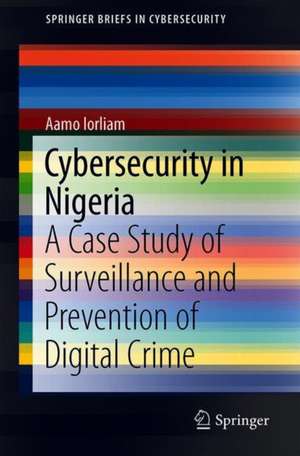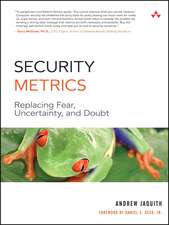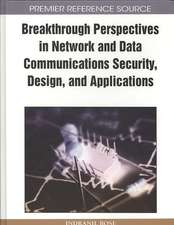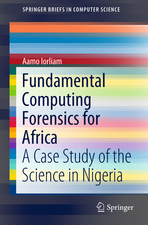Cybersecurity in Nigeria: A Case Study of Surveillance and Prevention of Digital Crime: SpringerBriefs in Cybersecurity
Autor Aamo Iorliamen Limba Engleză Paperback – 29 mar 2019
These cybercrimes are hampering Nigeria’s digital economy, and also help to explain why many Nigerians remain skeptical about Internet marketing and online transactions. If sensitive conversations using digital devices are not well monitored, Nigeria will be vulnerable to cyber-warfare, and its digital economy, military intelligence, and related sensitive industries will also suffer. The Nigerian Army Cyber Warfare Command was established in 2018 in order to combat terrorism, banditry, and other attacks by criminal groups in Nigeria. However, there remains an urgent need to produce digital surveillance software to help law enforcement agencies in Nigeria to detect and prevent these digitally facilitated crimes. The monitoring of Nigeria’s cyberspace and cyberinfrastructure has become imperative, given that the rate of criminal activities using technology has increased tremendously. In this regard, digital surveillance includes both passive forensic investigations (where an attack has already occurred) and active forensic investigations (real-time investigations that track attackers). In addition to reviewing the latest mobile device forensics, this book covers natural laws (Benford’s Law and Zipf’s Law) for network traffic analysis, mobile forensic tools, and digital surveillance software (e.g., A-BOT). It offers valuable insights into how digital surveillance software can be used to detect and prevent digitally facilitated crimes in Nigeria, andhighlights the benefits of adopting digital surveillance software in Nigeria and other countries facing the same issues.
Din seria SpringerBriefs in Cybersecurity
- 20%
 Preț: 269.75 lei
Preț: 269.75 lei - 20%
 Preț: 322.17 lei
Preț: 322.17 lei - 20%
 Preț: 324.31 lei
Preț: 324.31 lei - 20%
 Preț: 323.14 lei
Preț: 323.14 lei - 20%
 Preț: 321.00 lei
Preț: 321.00 lei - 20%
 Preț: 322.68 lei
Preț: 322.68 lei - 20%
 Preț: 323.99 lei
Preț: 323.99 lei - 20%
 Preț: 322.17 lei
Preț: 322.17 lei - 20%
 Preț: 324.64 lei
Preț: 324.64 lei - 20%
 Preț: 323.34 lei
Preț: 323.34 lei - 20%
 Preț: 322.17 lei
Preț: 322.17 lei - 15%
 Preț: 464.18 lei
Preț: 464.18 lei - 20%
 Preț: 380.90 lei
Preț: 380.90 lei - 20%
 Preț: 462.98 lei
Preț: 462.98 lei - 20%
 Preț: 294.86 lei
Preț: 294.86 lei - 20%
 Preț: 323.66 lei
Preț: 323.66 lei - 20%
 Preț: 349.98 lei
Preț: 349.98 lei
Preț: 349.80 lei
Preț vechi: 437.24 lei
-20% Nou
Puncte Express: 525
Preț estimativ în valută:
66.93€ • 70.07$ • 55.38£
66.93€ • 70.07$ • 55.38£
Carte tipărită la comandă
Livrare economică 05-19 aprilie
Preluare comenzi: 021 569.72.76
Specificații
ISBN-13: 9783030152093
ISBN-10: 303015209X
Pagini: 64
Ilustrații: XIV, 55 p. 19 illus., 15 illus. in color.
Dimensiuni: 155 x 235 mm
Greutate: 0.11 kg
Ediția:1st ed. 2019
Editura: Springer International Publishing
Colecția Springer
Seria SpringerBriefs in Cybersecurity
Locul publicării:Cham, Switzerland
ISBN-10: 303015209X
Pagini: 64
Ilustrații: XIV, 55 p. 19 illus., 15 illus. in color.
Dimensiuni: 155 x 235 mm
Greutate: 0.11 kg
Ediția:1st ed. 2019
Editura: Springer International Publishing
Colecția Springer
Seria SpringerBriefs in Cybersecurity
Locul publicării:Cham, Switzerland
Cuprins
Introduction.- Natural Laws (Benford’s Law and Zipf’s Law) for Network Traffic
Analysis.- Combination of Natural Laws (Benford’s Law and Zipf’s Law) for
Fake News Detection.- Cybersecurity and Mobile Device Forensic.- Proposed Digital Surveillance Software
Notă biografică
Dr. Iorliam Aamo has been a lecturer at the Department of Mathematics/Computer Science, Benue State University, Nigeria, since 2010. A leading researcher, he was awarded an MSc with distinction in Forensic Computing from Coventry University, UK. He then moved to the University of Surrey, UK, where he obtained his Ph.D. in Computer Science, focusing on the application of power laws to forensics, biometrics and network traffic analysis.
Textul de pe ultima copertă
This book reviews the use of digital surveillance for detecting, investigating and interpreting fraud associated with critical cyberinfrastructures in Nigeria, as it is well known that the country’s cyberspace and cyberinfrastructures are very porous, leaving too much room for cyber-attackers to freely operate. In 2017, there were 3,500 successful cyber-attacks on Nigerian cyberspace, which led to the country losing an estimated 450 million dollars.
These cybercrimes are hampering Nigeria’s digital economy, and also help to explain why many Nigerians remain skeptical about Internet marketing and online transactions. If sensitive conversations using digital devices are not well monitored, Nigeria will be vulnerable to cyber-warfare, and its digital economy, military intelligence, and related sensitive industries will also suffer.
The Nigerian Army Cyber Warfare Command was established in 2018 in order to combat terrorism, banditry, and other attacks by criminal groups in Nigeria. However, there remains an urgent need to produce digital surveillance software to help law enforcement agencies in Nigeria to detect and prevent these digitally facilitated crimes. The monitoring of Nigeria’s cyberspace and cyberinfrastructure has become imperative, given that the rate of criminal activities using technology has increased tremendously. In this regard, digital surveillance includes both passive forensic investigations (where an attack has already occurred) and active forensic investigations (real-time investigations that track attackers).
In addition to reviewing the latest mobile device forensics, this book covers natural laws (Benford’s Law and Zipf’s Law) for network traffic analysis, mobile forensic tools, and digital surveillance software (e.g., A-BOT). It offers valuable insights into how digital surveillance software can be used to detect and prevent digitally facilitated crimes in Nigeria, and highlights the benefits of adopting digital surveillance software in Nigeria and other countries facing the same issues.
The Nigerian Army Cyber Warfare Command was established in 2018 in order to combat terrorism, banditry, and other attacks by criminal groups in Nigeria. However, there remains an urgent need to produce digital surveillance software to help law enforcement agencies in Nigeria to detect and prevent these digitally facilitated crimes. The monitoring of Nigeria’s cyberspace and cyberinfrastructure has become imperative, given that the rate of criminal activities using technology has increased tremendously. In this regard, digital surveillance includes both passive forensic investigations (where an attack has already occurred) and active forensic investigations (real-time investigations that track attackers).
In addition to reviewing the latest mobile device forensics, this book covers natural laws (Benford’s Law and Zipf’s Law) for network traffic analysis, mobile forensic tools, and digital surveillance software (e.g., A-BOT). It offers valuable insights into how digital surveillance software can be used to detect and prevent digitally facilitated crimes in Nigeria, and highlights the benefits of adopting digital surveillance software in Nigeria and other countries facing the same issues.
Caracteristici
Presents a state-of-the-art review of mobile device forensics Explains how law enforcement agencies can use mobile device forensic tools to detect and prevent cybercrime Reviews the benefits of and challenges to digital surveillance in Nigeria










